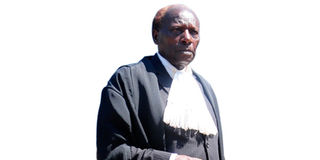40 years after Moshi Conference – Part III

What you need to know:
Advice. The chairman adjourned the meeting for another 15 minutes for additional consultations. I remember talking to UPC delegates Olara Otunnu and Omara Atubo who easily agreed to advice their delegations to drop Muwanga.
The nomination of Paulo Muwanga threw the delegates into utter confusion and the Tanzanians present at the conference were not amused. However, chairman Semei Nyanzi wisely addressed the conference and said that our hosts would be annoyed if we Ugandans started playing games and did not come up with one candidate.
He decided to adjourn the meeting and allow consultations among the delegates to unite behind one nomination. After the consultations, delegate Martin Alike stood up and addressed us on a point of information.
He said: “Dear brothers, while you were consulting, some of us had the opportunity to telephone the Tanzanian state house and inquire about the Tanzanian government position on the two candidates we had nominated. And we were informed in clear language that if we elect Paulo Muwanga, Tanzania will not have any business with us.
“On the other hand, if we elect Yusuf Lule, he and his colleagues you elect would be invited to state house for consultations with the view of hosting a new Ugandan government in exile. Before we abandon our Tanzanian brothers into the unknown with no hope, let me give you the truth about this renegade so-called liberator Paulo Muwanga.
“He is a conman who looted our Cairo embassy and pocketed every dollar there and just arrived last night via the border.”
There was a loud applause. Surprisingly, there were not many dissenting voices from the UPC delegations. Sam Ssebagereka, who was a member of my delegation and had been almost in tears when the name of Paulo Muwanga had been mentioned by the bishop, stood up and shouted in agreement with Martin Aliker, adding that Muwanga was a criminal and part of the UPC machine that terrorised and butchered Ugandans in Buganda.
The chairman adjourned the meeting for another 15 minutes for additional consultations. I remember talking to UPC delegates Olara Otunnu and Omara Atubo who easily agreed to advice their delegations to drop Muwanga so that Lule would be unanimously acclaimed as the chairman of the UNLF.
The additional consultations lasted for less than 10 minutes. On resumption of the meeting, Luwuliza Kirunda of the UPC addressed us and said in the spirit of reconciliation and patriotism, UPC and its allies in the conference had resolved to drop their candidate Muwanga and give their support to comrade Yusuf Lule as chairman for UNLF.
He condemned Dr Aliker and Ssebagereka for their wicked lies about compatriot Muwanga. After a calculated pause, however, he said: “In the spirit of brotherhood and unity, UPC begs that our own candidate whom we have sacrificed in the cause of unity should also be unanimously elected chairman of the small department of the military commission. He was seconded by delegate Oteng. With the preceding dramatic events, the delegates and observers were relieved that they did not object or put up another candidate.
That was how Muwanga became the chairman of the military commission. Yoweri Museveni, who had been quite vocal and militarily technical in advancing the cause of the military group in the conference, was elected vice chairman of the military commission. Prof Edward Rugumayo was elected chairman of the national consultative council of the UNLF legislative organ and Prof Dan Nabudere was elected chairman of the political and diplomatic commission.
The UNLF resolved that it would hold office for a period of two years uninterrupted. Except for UPC, its president Obote, Mwalimu Nyerere and their confidants, very few people knew that in fact UNLF and its government was destined to survive much less than two years.
In less than four months, the military commission, in collaboration with president Nyerere, Obote and Paulo Muwanga, sacked president Lule and his administration.
It organised the controversial 1980 general election merely to legitimise the second return to power of Milton Obote. The rest of what happened thereafter is contained in Prof Abdu Kasozi’s book The Social Origins of Violence in Uganda, 1964-1985, and my book Constitutional and Political History of Uganda from 1894 to Present.
Prof Kanyeihamba is a retired Supreme Court judge.
[email protected]


